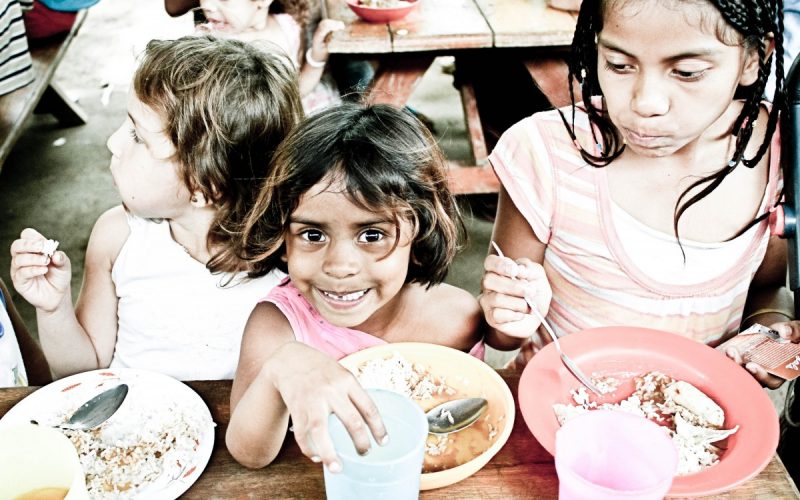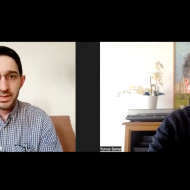According to the Food and Agriculture Organization of the United Nations (FAO) report on global food crisis, two-thirds of the world’s population are faced with hunger, most of whom are simultaneously trying to survive the wars that led to scarcity in the first place.
It’s difficult to emotionally distance yourself enough from the terrifying and shameful picture described in the report to form an objective assessment. Taking a look at how policies pursued by world leaders often only serve to increase suffering adds anger to the unruly mix, making it even more difficult to process the scale of the issue. What do world superpowers do with their vast material resources while two-thirds of the world’s population is subject to hunger and poverty? For the most part, they try to find new sources of personal profit. While millions are struggling to meet their basic needs, petrodollar giants in the Arab world are investing in an endless arms race and their intelligence communities in order to keep themselves protected.
Are Muslim countries condemned to scarcity?
A significant number of the countries indicated in the report are majority Muslim… but have their oil-rich Arab neighbors done anything to alleviate the situation?
This is nothing new: these Arab economic hubs are continuing their long-held policies of making multibillion-dollar investments in armaments and answering to Western powers. While we could theoretically look at arms industry spending as an investment, there is no possible explanation that could justify the opulent lifestyles and unreasonable expenses of these corrupt leaders.
The King of Saudi Arabia, Salman bin Abdulaziz, recently paid a visit to several foreign countries, making sure his lavish demands were met to be met in advance: “For the king and his retinue of 1,000 people, accompanied by an escort of two aircraft with their own escalator and elevator, and 459 tons of luggage, 546 royal suites were prepared. In addition, a spa center about the size of a football field will operate in the hotel hosting the king. ”
During one of Abdulaziz trips to France, the government shut down an entire hotel and public beach to the public, even leading to protests by French citizens.

PxHere
What did the Prophet teach us?
The Prophet (peace be upon him) of the entire Muslim world said that “a person who goes to bed full when his neighbor goes to bed hungry cannot be considered a true Muslim.” This hadith tells us that helping a neighbor is the sacred duty of any person, regardless of his religion or nationality. In another hadith, the Prophet Muhammad said: “If at least one person is left hungry in the area, the authorities of that place will move away from the protection of Allah.” These words are only becoming more relevant in today’s Muslim world where many countries have chosen to enrich a small clique while turning their backs on their Muslim brothers.
Yet, engagement with Muslim countries is essential to solving the problem, particularly given the fact that there is no longer hope that the West will take up the task. While the West’s relationship to the majority of Muslim nations makes them more likely to place sanctions than offer aid, what excuse do the oil representatives of the Islamic world have? Why do they turn a blind eye to the suffering of their fellow believers who are dying of hunger?
Will the Saudi King’s royal image be ruined if he is even briefly distracted from his luxurious lifestyle in order to help people on the verge of starvation?
What was revealed in the report
In total, the report indicates that around 113 million people in 53 countries were experiencing acute hunger in 2018.
The term “acute hunger” or “acute food shortage” refers to a situation where a person’s life is threatened by the lack of sufficient food. The term “chronic hunger” is used to describe a situation in which a person is deprived of the number of calories necessary to lead a normal, active lifestyle for an extended period of time.
In 2017, the figure came out to 124 million people, a drop of almost nine percent… however, it also indicates that since last year, the crises either intensified or saw no change in at least 17 countries.
Speaking at a meeting in Brussels, the European Commissioner for International Cooperation and Development, Neven Nimitz, stressed that the issue of food security is a global problem:
“In this regard, in the period from 2014 to 2020, the EU allocated about 9 billion euros for initiatives aimed at ensuring food security and sustainable agriculture in more than 60 countries. The report stresses the need for enhanced cooperation between humanitarian organizations and structures to promote development and stability in order to prevent food crises. A stronger global monitoring system can bring about fundamental positive changes in the situation of people in need, ”Mimica said.
Adding to his sentiment, the European Commissioner for Humanitarian Aid and Anti-Crisis Measures, Christos Stylianides, noted that the problem requires the joint efforts of all international players, saying: “Over the past three years, the number of studies devoted to this problem has increased significantly. The total budget allocated for the provision of humanitarian and food aid is about 2 billion euros. Food crises are becoming more acute and complex, and in order to cope with existing crises and prevent new ones, we must develop effective innovative methods. ”
The report goes on to call for close cooperation at the international level to attempt to meet the basic humanitarian needs of people suffering from severe food shortage. The document also stresses the need for serious efforts to reduce political tensions in crisis zones, hoping that peace will allow governments to attend to their economic needs instead of focusing on expensive war efforts.
It is unacceptable to allow people to die from hunger
FAO Director-General José Graziano da Silva, speaking at the presentation of the report in Brussels on April 2, stressed the tragic depth of the problem:
“The problem of hunger is key. The situation in which in the 21st-century people continue to die from hunger is horrendous and completely unacceptable. In order to save lives and ensure humanitarian development, it is necessary to strengthen the support of vulnerable people, to provide them with stable sources of livelihood, ” he said.









Leave a Reply